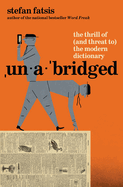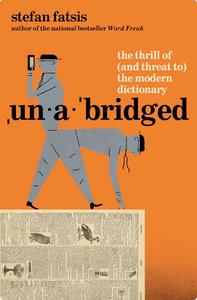
 In his erudite, fascinating fourth book, Unabridged, journalist and amateur lexicographer Stefan Fatsis (Word Freak) dives into the history of dictionaries in the United States, the process by which new words are "officially" added to the language, and the threats and challenges facing language. At once a chronicle of his time at Merriam-Webster (with corresponding attempts to draft dictionary definitions the company would use) and a love letter to language, Unabridged examines differing philosophies of word inclusion and considers how dictionaries can remain relevant in the digital age.
In his erudite, fascinating fourth book, Unabridged, journalist and amateur lexicographer Stefan Fatsis (Word Freak) dives into the history of dictionaries in the United States, the process by which new words are "officially" added to the language, and the threats and challenges facing language. At once a chronicle of his time at Merriam-Webster (with corresponding attempts to draft dictionary definitions the company would use) and a love letter to language, Unabridged examines differing philosophies of word inclusion and considers how dictionaries can remain relevant in the digital age.
Fatsis begins with Noah Webster himself, recounting Webster's early efforts at dictionary publishing (and the related business pressures that have dogged American dictionaries from the start). The Oxford English Dictionary, with its rather different history and approach, also receives significant real estate; Fatsis notes the broad divisions between American and British English (some of them created, or at least enshrined, by Webster). The narrative traces the progression of American dictionaries, including multiple landmark editions by Webster (later Merriam-Webster), one of which--Webster's New World Dictionary of the American Language (Second College Edition, Deluxe Color Edition)--is dear to the author's heart. Fatsis meets lexicographers, handles rare editions of dictionaries, and spends untold hours at Merriam-Webster's elegant headquarters in Springfield, Mass.--all detailed in his ruminative history of a largely under-the-radar world that nevertheless has helped shape American thought and language for more than two centuries.
Although Fatsis is a self-professed dictionary lover, he understands that language changes--and that dictionaries and other resources must meet the moment. Thus, he delves into the acquisition and painstaking definition of neologisms, or new words; examines Webster's approach to handling racial and other slurs; discusses the (sometimes explosive) shifting definitions and spectrum of pronouns; and wrestles with the looming question of artificial intelligence and its effect on language. He trawls the web (including his own journalistic oeuvre) for new words to include; parses the rules for definition and inclusion in the dictionary; revisits historical events and figures that gave rise to entirely new words; and visits a Greenwich Village apartment stuffed with more than 20,000 books, including dictionaries, periodicals, and ephemera from multiple eras.
While obviously appealing to word nerds and writers, Fatsis's narrative is more broadly relevant to anyone who speaks, reads, and writes in American English. It provides a thorough, thoughtful history of dictionaries and the language they both shape and record, while championing the dictionary's continued relevance in the 21st century. Lively, well-researched, and often entertaining, Unabridged is an essential resource for anyone interested in understanding how language evolves. --Katie Noah Gibson, blogger at Cakes, Tea and Dreams
Shelf Talker: Stefan Fatsis's erudite, fascinating fourth book is an entertaining deep dive into the history of dictionaries and how language continues to evolve in the 21st century.

